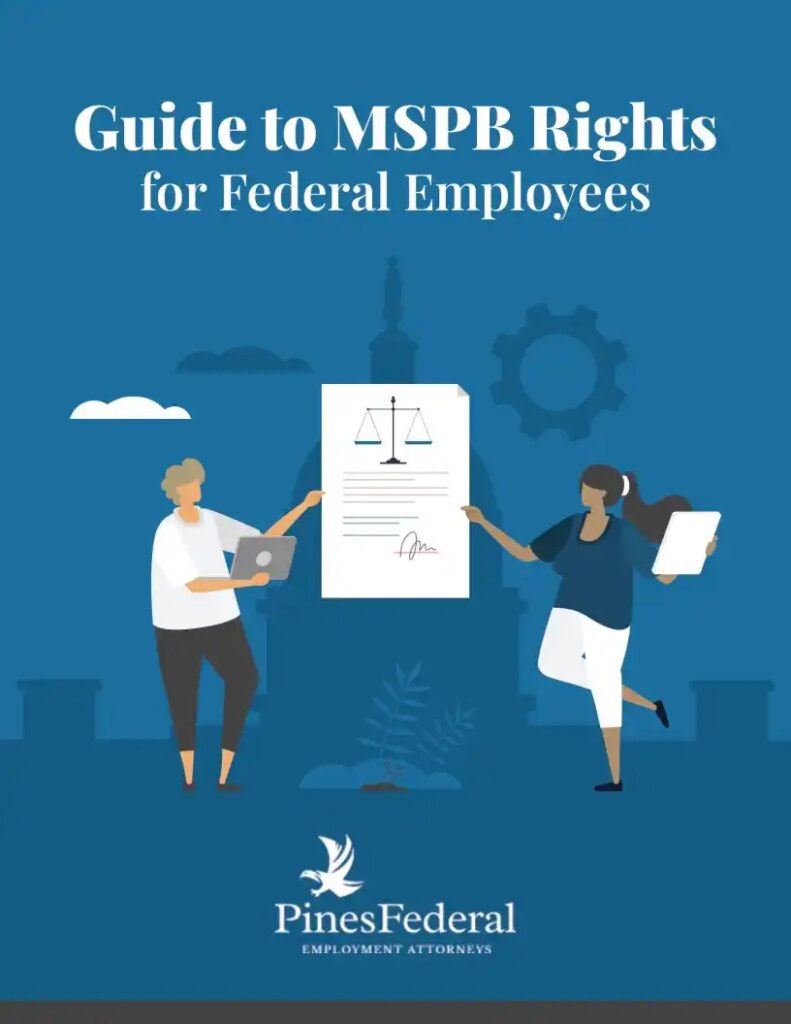
“Conduct Unbecoming” is an umbrella term designed to encompass a wide range of behaviors that do not fall into any other agency charge.
Unlike more specific charges, such as “Failure to Follow Instructions” or “Misuse of a Government Vehicle,” there are no specific elements for conduct unbecoming charges. Instead, the government needs to prove that the conduct occurred and that it detracted from your work.
Defending yourself against any form of disciplinary action is difficult. But crafting a solid defense is especially important with conduct unbecoming cases.
Read on to learn more about the basic meaning of the charge of conduct unbecoming and a few examples. However, if you have been charged with conduct unbecoming, it is critical you contact a qualified MSPB attorney immediately.
Contact us online or call (800) 801-0598 today to get started.


“I was so pleased working with Pines Federal. I had peace of mind knowing I would not have to deal with the federal agency and all was taken care of by Pines. They are professional and responsive. I was very happy with the outcome of my case. Hiring Pines was the best decision I made.”
What Is Conduct Unbecoming?
Before we get to examples of conduct unbecoming, the meaning of the phrase needs addressing.
The Merit Systems Protection Board has previously reiterated that the word “unbecoming” is anything “unattractive” or “detracting from one’s . . . character.” Needless to say, a whole range of actions can fall under this definition. To make matters more confusing, conduct unbecoming is, by nature, a subjective phrase.
Different kinds of people will come to different conclusions for whether some actions are appropriate or unbecoming. Agencies often abuse this ambiguity and charge employees with various conduct unbecoming to cover up their own ill-natured or illegal motivations.
Conduct Unbecoming Examples
To help you understand what conduct unbecoming can look like, consider the following examples of the charge from actual MSPB cases.
In one case, Miles v. Department of the Army, 55 MSPR 633 (1992), the Board affirmed a 45-day suspension of an employee for conduct unbecoming after he ran over and killed a deer with a government vehicle.
In another case, Crouse v. Department of the Treasury, 75 MSPR 57 (1997), an employee was demoted for the similar charge of “Unacceptable Behavior” after he spoke to a subordinate in a “harsh manner” and “point[ed]” at her chest” with his fingers.
Other examples of conduct unbecoming could include things like:
- Speaking disrespectfully to a supervisor or customer,
- Playing a practical joke on a colleague,
- Using profanity in the workplace,
- Lying to a manager,
- Placing a hand over a coworker’s mouth to interrupt them, and
- Making sexually explicit comments to a coworker.
These are just a few examples. Many other actions fall within the purview of this generic charge.
Defending Against Conduct Unbecoming a Federal Employee
Fortunately, you have several strategies available to defend yourself against conduct unbecoming charges.
The first and most obvious tactic is to dispute the claims surrounding the underlying behavior. If you can cast doubt on the agency’s claims regarding what happened, then you can prevail on your case without needing to argue whether the behavior was inappropriate.
Another approach is to show that the agency’s charges are vague and fail to give you a real opportunity to respond. Because agencies sometimes use conduct unbecoming charges to discriminate illegally against employees, it may be a good idea to look for signs you are being discriminated against.
In addition to these basic tactics, there are several more technical rebuttals that may prove effective. An experienced federal employment lawyer will be well-versed in developing these arguments and applying them to your case.
A qualified federal employment attorney can also help you:
- Collect evidence that proves your innocence,
- Find witnesses that can testify in your favor,
- Obtain valuable documents that support your actions, and
- Negotiate aggressively with agency legal representatives to obtain a favorable settlement.
For all these reasons, you should strongly consider contacting a federal employment attorney.
Our Team of Skillful MSPB Attorneys Can Help Save Your Career
Few things are more important than obtaining a lawyer to represent you. Yet not all attorneys are made equal.
If you want to maximize your chances of prevailing before a Merit Systems Protection Board (MSPB) judge, then you need a lawyer who is experienced in employment matters. It is also necessary for your counsel to have a track record of success.
Every one of our lawyers at Pines Federal has many years of experience defending federal employees. In fact, we have over 50 years of collective experience fighting for our clients.
On top of that, our passion for helping our clients has saved many careers. With us, you can rest assured you will receive the client service you deserve and the dedicated representation you need.
Don’t wait another moment. Let’s start right away. Give us a call at (800) 801-0598 or reach out online to start your journey for justice.
[DOWNLOAD] MSPB Rights for Federal Employees
